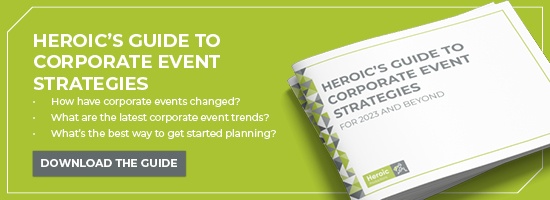Planning and executing a successful event can be challenging, regardless of whether you are working with more limited resources. Let’s consider 5 tips to help you make the most of your corporate event budget, whatever its size.
Corporate event budget tips
1. Set clear objectives.
Before you start planning your event, it’s crucial to set strategic goals and think through what you want to achieve. Why are you gathering this group? Consider the event’s tone and what types of activities will help set the atmosphere. If your team has faced budgetary setbacks, consider attendees’ perspectives going into an event. It could be beneficial to acknowledge company challenges while encouraging everyone to celebrate their accomplishments.
Ultimately, a corporate event creates an environment where attendees can engage in meaningful conversations. Tailor each event to meet your organization’s needs, including what attendees may need. Consider what discussions you want your attendees to have, set your goals, and build an event strategy from there.

2. Prioritize the essentials to maximize your corporate event budget.
With a strategy in mind, you can develop an event to meet your goals, all while prioritizing what’s most important. Put yourself in the place of the attendees to understand what they need. Do you want to provide them with snacks or full-course meals? Certainly, you don’t want your attendees to leave hungry, but consider where your investment will be most valuable for them when developing your catering budget.
Would music set the atmosphere? Or a post-awards dance party? The difference is in the details. It costs nothing to be thoughtful. If your company is hosting challenging discussions this year, you might consider offering breakout sessions, allowing attendees to process the information they’re getting from event speakers. Give them time to have offline conversations to gain valuable insights from one another. Taking this approach can help build team morale and give your attendees a positive and hopeful post-event feeling.
3. Reconsider your venue.
Venue selection is a major factor in the success of your event, but choosing an exciting location doesn’t have to mean breaking your budget on tickets to Hawaii. Instead of an expensive team getaway, consider hosting an event in a local museum, art gallery, or brewery. A local garden party could mean more to your attendees than a banquet room hours from home. There are so many unique venue options between a costly five-star resort and the no-cost office breakroom. Get creative!
Another option is to find an in-budget price by booking your venue during an off-peak season or daytime hours. Give yourself time for this strategy. By leaving some wiggle room in your schedule, you’ll be able to take advantage of discounts and avoid last-minute costs.
4. Use available technology.
If your corporate event budget doesn’t allow a particular guest speaker to attend in person this year, there’s an app for that. Virtual meeting rooms can enhance your event without draining event funds. Technology options go far beyond Zoom. You might consider incorporating virtual reality, social media, and live streaming to add an extra layer of excitement to your event.
Technology gives us opportunities to liven up events and make them more engaging for attendees. If you’ve opted not to hire a band for the sales meeting this year, you can still rent a disco ball and a great sound system. Or, better yet, why not ask everyone on the team what their favorite artists are and make a Spotify playlist from their selections?
There are free or inexpensive applications available for marketing and promoting your events. Eventbrite is a free option to register attendees and measure engagement. Other options include Eventzilla, Whova, and Splash, which offer comprehensive solutions for corporate event success.
Recommended Reading: 5 Tips for Finding an Awesome Virtual Event Speaker
5. Honesty is the best policy.
Messaging should always be a key part of corporate event budget and strategy, especially when a message may be more difficult for attendees to process. It sends an unsettling message when a company hosts an annual sales event and visibly reduces the budget for one of the events. Perhaps even more disconcerting is when a company announces layoffs and hosts a high-budget celebratory concert in the same year.
Before you plan an event, think about the messaging for your attendees, and be as clear as you can in communicating that message. There’s no shame in hosting a team-building event locally for the first time in ten years, but it may help attendees to hear their CEO explain why there was a change. A tightened corporate event budget doesn’t mean letting go of the fun! But in our experience, honesty is the best policy.
The corporate event budget must go on!
Corporate events should be entertaining and—no matter how big or small your corporate event budget is. Corporate events will always be a great way to build relationships and showcase your company’s values. Get creative and think ahead. With careful planning and precise execution, an event can be a valuable investment in team building and driving business growth.
To strategize your next corporate event budget, talk to us.



